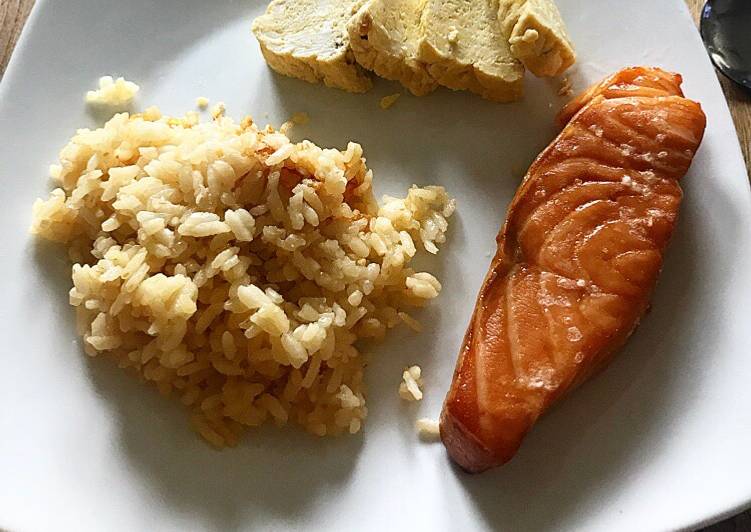Traditional Japanese Breakfast. Typically, a traditional Japanese breakfast consists of steamed rice, miso soup, a protein such as grilled fish, and various side dishes. Familiar side dishes may include tsukemono (Japanese pickles), nori (dried seasoned seaweed), natto (fermented soybeans), kobachi (small side dishes which usually consist of vegetables), and a green salad. Rice is often the base ingredient of a Japanese breakfast.
 Some people will use brown rice or regular white rice instead.
The traditional Japanese Breakfast often includes savory food.
Thus, it is important for Japanese culture that this morning meal consists of easily digestible and balanced ingredients.
You can have Traditional Japanese Breakfast using 16 ingredients and 6 steps. Here is how you cook it.
Some people will use brown rice or regular white rice instead.
The traditional Japanese Breakfast often includes savory food.
Thus, it is important for Japanese culture that this morning meal consists of easily digestible and balanced ingredients.
You can have Traditional Japanese Breakfast using 16 ingredients and 6 steps. Here is how you cook it.
Ingredients of Traditional Japanese Breakfast
- Prepare of Grilled Salted Fish:.
- Prepare 2 of small salmon fillets.
- Prepare of Sea salt/ course salt.
- You need of Tamagoyaki:.
- Prepare 3 of Egg.
- You need 3 Tbsp of chicken stock.
- Prepare 2 Tsp of sugar.
- You need 1 Tbsp of soy sauce.
- It's of Rice:.
- Prepare 1/2 Cup of rice (Arborio rice/short grain).
- You need 5 Tbsp of chicken stock.
- Prepare 2 Tbsp of soy sauce.
- Prepare of Miso soup:.
- It's packet of Miso soup.
- You need 1 Cup of water.
- Prepare of Green onion.
However, many young Japanese are now introducing more Western habits such as toasts, jam, cereals, fruits, coffee in order to save time. As the name implies, this breakfast could pass for someone's lunch or dinner, but one important feature of a traditional Japanese breakfast like the one pictured above is that it is fairly light -- no greasy, deep fried, or overly rich items, and the portions can be adjusted (less rice? The main component of a typical Japanese breakfast bowl is rice, be it steamed rice or rice porridge. It serves as the main source of carbohydrates in the Japanese diet.
Traditional Japanese Breakfast instructions
- The night before, salt your salmon and wrap with paper towel and put in container over night..
- Next morning: your salmon will be dry and moist. Sprinkle with sea salt and place in the oven at 400 degrees F for 20 minutes..
- Let’s make tamagoyaki! Mix your seasoning and egg. Use a rectangle pan and grease. Pour a little bit of egg mixture and wait to cook enough to roll. Once you roll, slide back to the back of the pan and add more egg and repeat..
- Steam your rice with the broth, water and soy sauce for 25 minutes (when absorbed) add a little more water if needed..
- Add hot water to miso packet..
- Plate and enjoy!.
The high-quality proteins are another requirement of a wholesome Japanese breakfast. You will find fish, chicken, or at least eggs in a traditional Japanese breakfast. The main carbohydrate source in Japanese cuisine is white rice (hakumai) or brown rice (genmai), and that includes for breakfast. The rice is steamed for a simple breakfast meal, gohan. Sometimes the rice is used to prepare okayu, a rice porridge, a favorite of kids and adults alike.